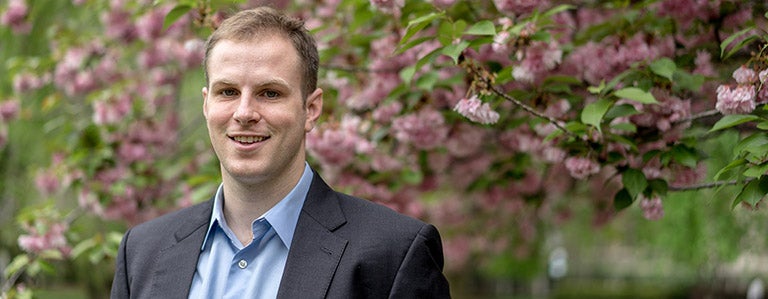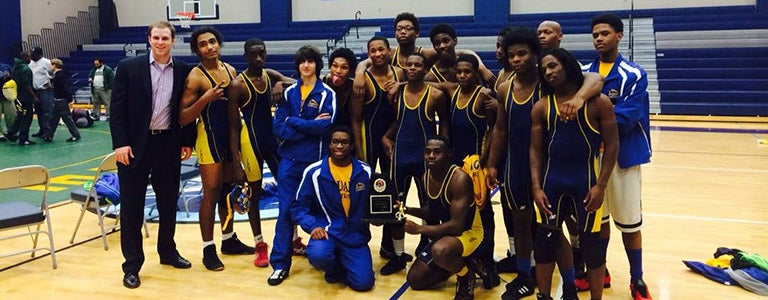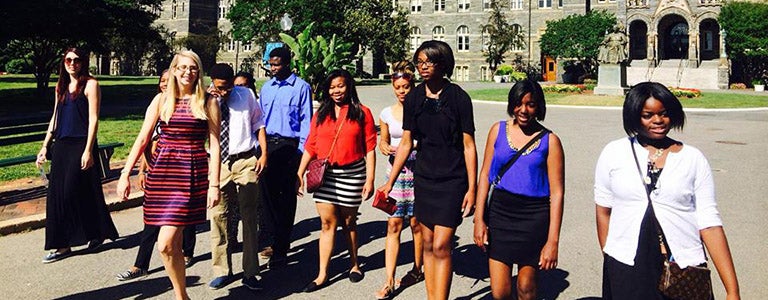The Beauty of Life in Service

Huntsville, AL is a hub of space flight and biotechnology, a World War II-era manufacturing center, and the fourth-largest city in the state. You might have known some of these things—maybe even all, if you’re a native Alabamian or trivia buff.
Chris Scribner (C’10, G’15) was neither when he became one of Huntsville’s newest public school teachers in 2013.
He’s still there today, having invested far more in the community than any teaching contract ever asked of him. He’s founded a competitive wrestling program and brought underrepresented high schoolers on their first college tours. He’s currently watching a student go through one of the most difficult decisions of her life: whether to leave the familiarity of northern Alabama for the stone towers of Georgetown.
It wasn’t so long ago, though, that the idea of a life dedicated to service seemed foreign to Chris Scribner, who struggled with alcoholism before he could have a legal drink.
A DIFFICULT PATH
“By my senior year of high school, I had been intervened upon a couple of times, and didn’t get the message,” he said.
After he was expelled from high school, moved to a rehabilitation program in Washington state. He received his diploma from a local school and, as he grew comfortable in his sobriety, began to consider a college education.
Enter Augsburg College, a small Lutheran school in Minneapolis with the nationally renowned StepUp Program, which supports students who are recovering from chemical dependency as they attend the school.
“I got to live with other students in recovery, spend two years in a safe environment and get a great education,” Scribner said.
Two years into his college career, Scribner had become confident that he could stay sober even outside Augsburg’s dedicated sobriety program. Having known a student who had made the jump from Augsburg to a successful career at Georgetown, he applied and was accepted.
The transition to a traditional college campus would be difficult, he knew. He described his first days on the Hilltop as “jarring.”
But soon after arriving, Scribner found the stability and motivation he needed. He joined the lightweight crew team, which he described as a “family” and which provided much-needed structure and discipline. His chaplain-in-residence, Father Kevin O’Brien, S.J., reassured him that support was there for him. He loved his New Student Orientation experience so much that he became an orientation advisor his senior year, and before long he felt that he had truly found a home.
“Chris was very outgoing, very personable, very at ease,” said Tony Johnson, longtime director of Georgetown’s crew program. “He fit into the mold of the type of guy we look for in crew — a guy who’s going to work hard, be a good teammate, be reliable, and be involved in any number of other things.”
Scribner could have graduated after two years at Georgetown, but chose to stay for another semester to spend as much time as possible with the groups that helped him stay anchored. Three months after much of his class had graduated, he was back on the Hilltop working as an NSO coordinator.
Before this extra semester, the only hints Scribner had gotten of a future vocation was from his work as a tutor in the Writing Center and as a counselor for three summers at Camp Starfish, which served children with emotional and learning disorders. A class in his final semester with College philosophy professor Mark Lance showed him how to make teaching cool.
“I had never liked school in my life,” Scribner said. “It was in my last class, in my last semester in college, that I met this professor who made me fall in love with education. It was a pivotal time during which I finally found my voice in an academic setting.”
He had caught the teaching bug, it seemed, but wasn’t sure when or how he’d be ready to pursue it. He leaned in to the life of an early-twentysomething in D.C., pursuing a master’s degree in journalism and getting a job as a driver and deputy press secretary with Sen. Chuck Schumer (D-NY). He loved the job and staff, but he couldn’t shake the urge to work with youth who lacked access to the same opportunities he had.
It took two full years on the Hill for Scribner to realize he was ready to dive into education. At the urging of his Writing Center coworker Berkley Braden (C’11) — who went on to Teach for America in New York City and now works in the Georgetown’s Office of Undergraduate Admissions — he completed the TFA application process, was accepted, and received his assignment in the spring of 2013.
“I was not ready to be placed in Alabama. … But I said ‘You know what? If that’s what’s meant to be, I’ll go,” he said.

Chris Scribner poses with the J.O. Johnson wrestling team. Photo courtesy Chris Scribner.
THE BEAUTIFUL COMMUNITY
Huntsville’s public schools remain under a 46-year-old federal desegregation order that limits their autonomy to this day. Racial divisions are sharp and equality of opportunity largely a myth; the city’s predominantly white public high schools are some of the best in the state, while those drawing from minority neighborhoods struggle to send even a smattering of their students to college.
J.O. Johnson High School, where Scribner was to teach social studies, has one of the highest concentrations of poverty in the state. Scribner estimates that its college acceptance rate was less than 10 percent in 2013, though many of his students his first year spoke of a desire to pursue college.
Scribner saw incredible potential in his students, almost all of whom lived near or below the poverty line, but inadequate social services to support them.
“Our young people at Johnson are really smart. They’re the reason we as teachers do what we do,” he said. “In North Huntsville, where I lived and worked, you see this intelligence, creativity, loyalty, spirituality — this beautiful community that has been marginalized for anywhere from 50 to 200 years.”
It wasn’t long before Scribner immersed himself in this community. He was recruited to run the wrestling team — a “team,” he soon discovered, bereft of mats, uniforms, and practice space.
An anonymous donor from New York made a gift to the school that would allow the team to practice and, eventually, compete at a high level. The Jaguars soon contended for statewide honors, despite no semblance of a program when Scribner arrived.
But the donation fund eclipsed the needs of the wrestling program, and the J.O. Johnson administration was soon left asking itself an unfamiliar question: What should we do with this money?
Scribner and fellow TFA teachers Emily Heller and Katharine Martin proposed a simple idea: College tours.
As Scribner saw it, a major obstacle between his talented students and a college education was lack of exposure. After the white and middle-class black flight from Johnson High School in the 1980s and 90s, going to college simply wasn’t something Scribner saw many of his students doing. Even brilliant students never set foot on campus.
“College just wasn’t an expectation for too many of our students,” he said.
With that basic theory and leftover wrestling funds to test it, Scribner and his colleagues packed a bus full of curious students for a tour of Vanderbilt University.

A CAP & GOWN Project tour crosses Healy Circle. Photo courtesy of the CAP & GOWN Project.
SuSTAINABLE SERVICE
Two years later, the experiment has evolved into the CAP & GOWN Project. CAP & GOWN is a nonprofit that organizes trips for Huntsville students from low-income homes who wish to tour universities throughout Alabama and along the eastern seaboard. It has since expanded to include ACT tutoring and has partnered with the school district and TFA alums to provide a summer program, called STEM Summer Institute.
CAP & GOWN has been a resounding success: Scribner estimates that the number of J.O. Johnson students accepted to college has risen from less than 10 percent in 2013 to more than 70 this year. One of his students was accepted to Georgetown this year, the first from her school since Jerelisa Leslie (C’12). The idea of a such a dramatic transition is daunting, but Scribner hopes the support offered by the Georgetown Scholarship Program will help convince her to make the jump.
“Because she’s had the chance to meet with Missy Foy in GSP — a hero of mine — my student knows that if she were to come here, she’d have support that is second to none,” he said.
But for all their successes, neither CAP & GOWN nor a medal-winning wrestling team can erase decades of abysmal academic performance, or resolve a half-century-old desegregation battle.
Designated a “failing school” by the state, J.O. Johnson High School will shut its doors for good this week, the majority of its students moving to newly constructed Mae Jemison High School just down the road. Scribner will follow for at least a year, in order to see his first cohort of students graduate and ensure CAP & GOWN remains sustainable independent of its founders.
He prefers not to plan beyond that — he’s a one-day-at-a-time thinker. But for the man who credits his continued existence to the kindness and support of others, he’s certain of one thing: He’s going to keep giving back.
“The beauty of life is in getting to participate in the successes and challenges of others,” Scribner said. “Because of Georgetown, because of what I’ve been offered here, every day I’m alive on Earth I hope to make about other people.”
— Patrick Curran